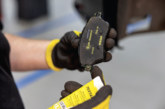Lee Gratton, Operations Director and Co-Founder of Spartan Motor Factors, explains how the business managed to overcome the odds and grow Spartan Motor Factors into one of the largest parts’ distributors in Wales.
Q. Could you provide a little more detail on how you got into the factoring business?
Lee Gratton (LG): I started working for a motor factor in Cardiff in 1996. My roles included checking off stock deliveries, picking stock for the delivery drivers, re- lining commercial brake shoes and making number plates. Gradually, I managed to work my way up to the phones and taking customers’ orders.
After three years – I was 21 by this point – I was given my own branch in Barry. For the next ten years, I managed this branch to ensure the business continued to run smoothly, occasionally overseeing the Cardiff branch when the owner was away on annual leave.
In 2011, I decided that I no longer felt the business was reaching its potential and due to these frustrations I left and decided to open a motor factor of my own. I contacted Jason Farrugia, a friend of mine who was currently working as an officer in the RAF and had a background in accountancy. Knowing that Jason was looking to leave the military, we put our heads together and came up with a plan for Spartan Motor Factors. Dave Webb was the Assistant Manager in the Newport branch of the same motor factor that I had worked for and had the perfect location in mind for our first branch, so he came aboard. The three of us opened up our first branch on Malpas Rd, Newport, in January 2012.
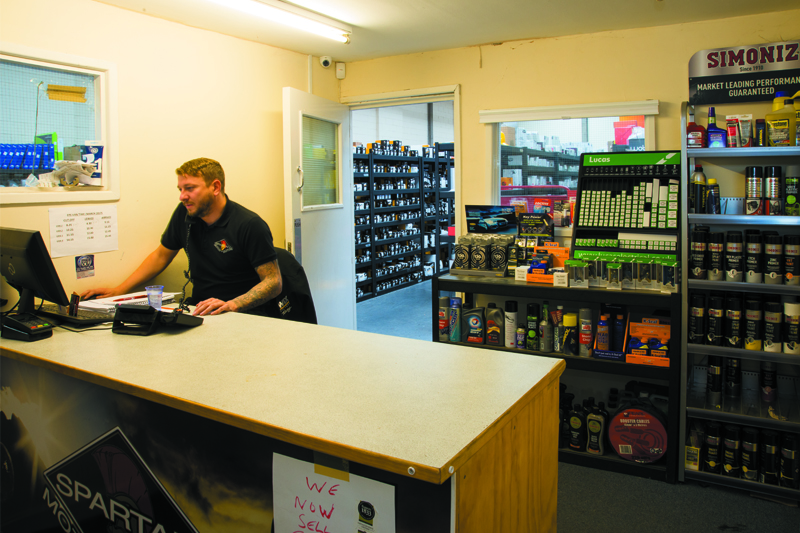
Q. What was the biggest challenge when opening a motor factor in the middle of a recession?
LG: The list of challenges seemed endless at the time. Due to the fact that we were a new business, the bank would only provide us with limited funding, and some suppliers would only deal with us on a cash basis, whilst others refused to deal with us at all until we had been operating for at least six months.
Many suppliers were told not to deal with us by our more established competitors in the area, with threats of losing business bandied about. For example, one supplier had put a stock pack worth £7,000 into us and three weeks later came to take it away due to a threat he allegedly received from a competitor of ours.
The first six months were very stressful. We did not even have an FPS account at the time, which put us at a huge disadvantage to other factors. We scraped through the first six months by offering customers the best service we could – we opened at 7am and closed at 6pm, 7 days a week. To make matters worse, another stumbling block was that three months after we opened, Euro Car Parts decided to open up in the same town. Everything was against us!
Q. Even though Motaquip provided the essentials in that first year, how did you get the Spartan name out there?
LG: Motaquip was essential for us. It provided a service through which we could order stock from them in the evening and they would deliver the order to our premises at 5am the following morning. We would arrive at work at 7am and the stock would all be there; we would check it off and deliver the urgent parts to the garages before the other motor factors would even begin their deliveries for the day. This was the advantage we needed over the competition to get the company going and without Motaquip’s support we may not have got through that first year.
When it came to the marketing side of things, we did a lot of repping ourselves to get the Spartan name out there. Dave and I already had 25 years’ experience in the trade so we had a good idea of the garages’ frustrations and how to fix them. We also entered for a number of industry awards in various ‘Small Factor’ categories, finding success in 2012, 2013 and 2014. Winning these awards got us recognised and suppliers began to allow us to open accounts with them and expand the range of products that we could now supply.
Q. In your opinion, what was it that brought on Spartan success?
LG: Our success has been down to taking risks. If you do not take the risks then you do not reap the rewards. Jason has been extremely successful at raising capital for our expansion plans, whilst also ensuring we get the best deals from all of our suppliers when opening new depots.
During our first three years, the recession hit our competitors hard, forcing them to close. Three in Cardiff, two in Newport and one in Barry – all closed. We decided to make the most of the gaps in the market and employ as many of the staff that were made redundant from these businesses as we could. This helped us grow at such a fast pace that we had four depots in four years, all with managers who had at least 20 years’ experience.
We are also very customer focused. We supply three ranges of most parts, such as pads, discs and filters, to give customers the option of quality based on their customers’ budget or age of the vehicle they are working on. We have 55 delivery vans to ensure the customers are not waiting around for parts and we use four vans to move the stock between the different branches. This means that if a customer from Swansea, for instance, needs a part from Weston-super-Mare, then they can order that part knowing they will receive it on the same day. We also joined the IFA buying group, which has increased our buying power.
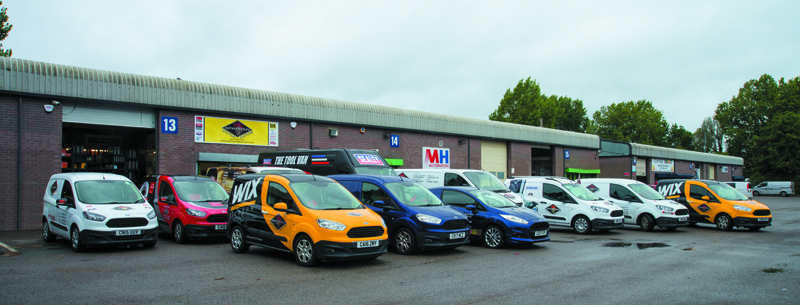
Q. Opening a branch per year is no easy task. How did you manage it?
LG: Opening branches has actually become easier now that we have increased in size. Potential employees are actively approaching us with areas that they think we should move into and suppliers are offering better terms on stock packs and extended terms on payments. We now know how long it takes to organise everything needed to open a new depot, taking into account BT, computers, stock requirements, vans, staff and signage.
Having 10 depots has its difficulties. For example, we have 100 staff, so arranging holiday cover and sickness is a full time job; the 55-strong van fleet needs monitoring, as well as servicing and insurance/MOT; we also have over 200 suppliers to manage and stock control between the branches to consider, which is massively time-consuming. In response, we have employed three area managers to help support and advise the branches, which has taken a workload off of us, the owners, so that we can concentrate on our further expansion plans.
Q. Why did you feel like you needed to diversify your branches; venturing into refinishing, cooling, etc.?
LG: Well, the refinishing project was originally started in our Newport depot by Dan Webb. It was a great success and we have since rolled this same model out into our Pontypridd, Bridgend and Cardiff depots. They specialise in automotive paints and accessories and have helped us become a one-stop shop for all of our customers. Customers were frustrated with the delivery service of their current paint suppliers, so it made sense that we step in and use our speedy delivery service to get to customers up to 15 times a day, compared to the one delivery a day they were previously getting.
The cooling branch came about in May this year. The five members of staff we took on to open it had 15 years’ experience each. They repair radiators for all vehicles such as vintage cars, forklifts, commercial vehicles and light vehicles. They were all very excited to join us as we had a much wider reach than their former employer.
By becoming a part of the Spartan team they could now service customers from Swansea to Weston-super-Mare, across 10 depots. They now have the tools to make a success of this side of the business, with over £200k worth of radiators and A/C parts on the shelf for same-day delivery. The branch is growing from strength to strength and has proven that we were right to take it on in just the short time they’ve been open.

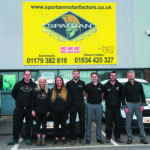
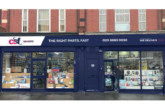


![The [M]enable mental health movement explained](https://pmfmag.co.uk/wp-content/uploads/2024/03/Menable-mental-health-165x109.jpg)

